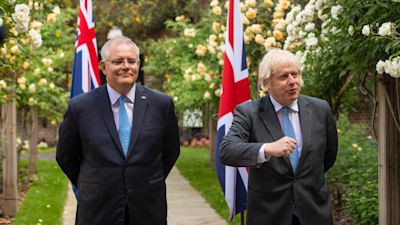UK-Australia trade deal is more important politically than economically

Boris Johnson presented the new trade deal 'as a big win', says ITV News Business and Economics Editor Joel Hills
This trade deal is significant, not least because it is the first bilateral agreement that the UK has negotiated since leaving the European Union.
It removes the taxes and quotas that the Australian government currently imposes on a range of UK exports - tariffs on Scotch whisky and British-built cars are levied at 5%.
It is a step towards UK membership of the Comprehensive and Progressive Agreement for Trans-Pacific Partnership - a trade bloc of 11 countries, including Vietnam and Malaysia - and dangles the prospect of easier access to new markets for UK exporters.
Young people in the UK will enjoy even greater freedom than they currently do to live and work in Australia.
British consumers are being promised greater choice and lower prices on a range of Australian imports, from wine to biscuits and sweets. The government calculates households will save £34 million a year - which works out at around £1.22 per household.
The government’s own analysis suggest this agreement will grow the economy by 0.01% and 0.02% in the long-term. That’s not nothing but neither is it very substantial.
One reason, of course, is that Australia is a long way away.
Countries tend to trade more with countries closer to them. The UK can sign trade deal with Australian, China and the United States and that will obviously help in terms of increase trade with those countries.
But the government’s own analysis suggests there’s little prospect of those trade deals, even cumulatively, coming anywhere near in terms of scale of the trade we're losing with the European Union because of the Brexit deal.
'We sell boomerangs to Australia, of a non-returnable variety. Thanks to this deal, we hope that there will be even more trade between the UK and Australia,' says Boris Johnson as the trade deal is agreed
The UK exported about £4.5 billion of goods to Australia in the 12 months to March 2021. Over the same period it shipped £139 billion to the EU.
Perhaps the most interesting thing about this trade deal is it sets the template for those to come. Particularly the glittering prize: a trade deal with the United States.
Ever since Brexit, there has been concern about whether the UK would make concessions on food standards in order to secure an agreement with the US.
To that end, it is striking that Liz Truss is upholding the EU ban on imports of hormone-treated beef. This will delight UK farmers (who can’t rear cattle using hormones) and environmentalists but will obviously limit the benefits consumers experience.
Producers tend to shout loudest during trade talks as they (rather than consumers) worry most about increased competition. But agriculture is a tiny part of the UK economy.
The full detail of this agreement has yet to be published but, at first glance, there doesn’t seem to be very much on the table for providers of services - which makes up the bulk of UK output.
Banks and insurers seem confident they will get somewhat greater access to markets in Australia. We’ll have to wait for the final details.
Businesses call for new push from UK and EU over NI Protocol
UK to target India’s middle class and young people in trade deal